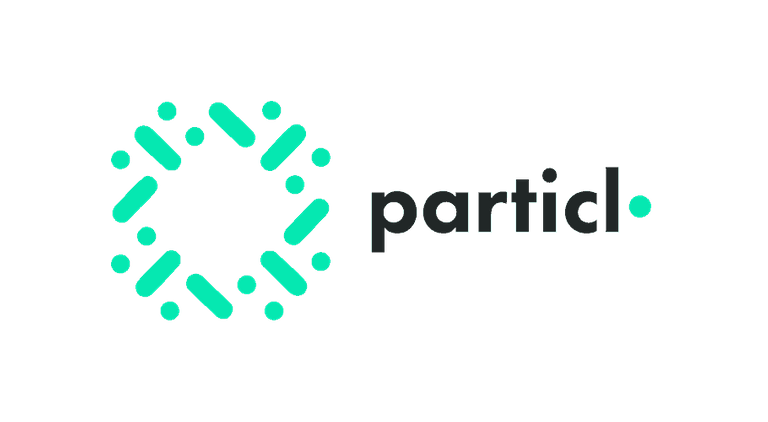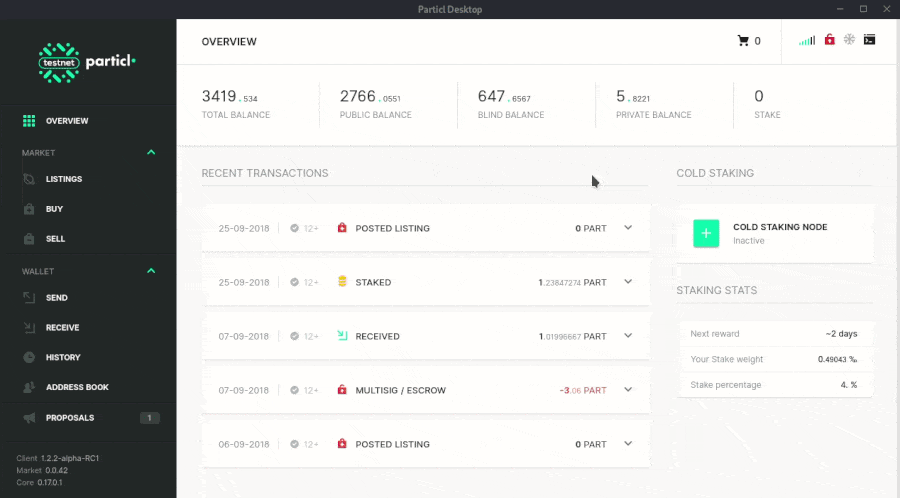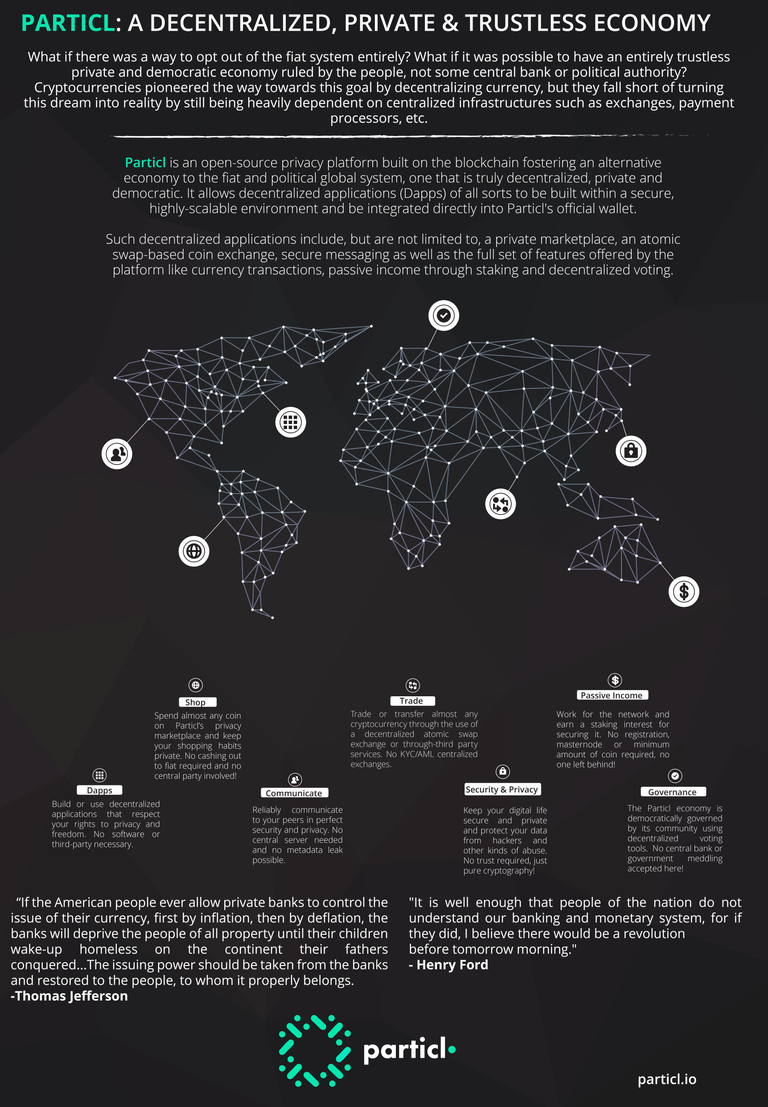
Interview with CryptoBean community manager for Particl.
What is Particl in a nutshell?
Particl is an open source project that is building a privacy-focused economy using blockchain technology. The upcoming flagship dapp is a privacy-focused marketplace designed to for users to buy and sell products in a truly p2p and anonymous fashion as there will be absolutely no middle-men involved.
The long-term goal is to build additional privacy-focused dapps and allow for external developers to contribute dapps of their own to the network.
The PART coin functions as a currency (for buying/selling), as a governance stake (for voting on network proposals and takedown notices for market listings), and as a utility to pay network transaction fees to stakers.
What is the current staking ROI and how will this evolve in the future?
When Particl began in 2017, the inflation rate was set to be 5% initially and drop by 1% per year until it settles indefinitely at 2%. Right now we are in the 2nd year of the chain so there is a 4% inflation rate that is paid entirely* to the stakers. In addition, all transaction fees within a block, including Particl Marketplace fees, are paid to the staker that generates a given block. As network usage increases (as we expect it to do post-marketplace) then this could generate quite a lot more passive-income than the inflation rate alone.
*see team funding structure later in the interview
Can you tell us more about the staking procedures?
In late 2017, Particl hard-forked to introduce the concept of Cold Staking. The general idea is that this lets you keep your coins in one address but delegate your staking ability to another.
The purpose of this is to increase security as it makes your PART coins quantum-resistant because the public key of the address that actually holds them is never revealed to the network. The pairing between Hot (your address doing the staking) and Cold (the address holding your coins) addresses is achieved through a smart-contract that is implemented using BIP65. It is actually possible to store your PART coins on a Ledger device while they are staking!
Are there any online tools which can facilitate staking?
There is a cold-staking pool being built right now. This will allow people with a small number of coins to pool their coins together in order to get more consistent stake rewards. The pool is implemented in such a way that is is impossible for the pool operator to steal the coins that havebeen contributed to it (since the coins will stay in their Cold addresses and only the staking ability of the Hot address will be granted to the pool operator). The source code for this project is available here: https://github.com/tecnovert/particl-coldstakepool
Are there any other forms of income associated with the Particl tokens?
Particl Marketplace, the upcoming first Particl Dapp, will also redistribute the entirety of the fees its generates to stakers. At this time, however, staking rewards and transaction fees are the current passive-income aspects of this network. As more dapps become built, they may create additional ways to make use of the network which in turn would generate new types of transaction fees (for example, the listing fees on the marketplace get turned into transaction fees which in turn get paid to the stakers).
Sellers that want to create a listing will pay a small listing fee to do so. The fee is calculated based on the size of their listing (size of text content plus size of the optional picture) as well as for how long they want the listing to stay up. Regardless of these parameters, it is expected to cost only a few cents at most to create a listing. There will be NO middle-man fees taken from a completed sale, unlike nearly all other e-commerce platforms.
Will the dApps being built inside the wallet charge fees and will the token holders be entitled to a share of those fees?
It will be up to the dapp creators to decide how to handle fees for their usage, but yes all transaction fees generated on the network will be distributed to the stakers.
Can you tell us more about the milestones related to the above-mentioned sources of passive income?
I would say that Particl's first milestone in this context would be the hard-fork that added Cold Staking since it gave passive-income seekers a very secure way to participate in the network.
The next major milestone, in my opinion, will be the release of the marketplace dapp on the mainnet as this should, in theory, cause an increase in network usage and transaction fees.
Finally, the introduction of an SDK (Software Development Kit) will allow external development teams to contribute dapps of their own.

What are the competitive advantages of Particl in the markets it will be participating in?
I believe that Particl's implementation of MAD Escrow is a game-changer when it comes to e-commerce as it allows for two parties to trustlessly conduct a transaction between each other without the need for a third-party to manage the escrow.
The general idea behind MAD (Mutually Assured Destruction) is that each party (the buyer and the seller) put into escrow the cost of the sale in addition to the sale itself. So for a $10 sale, the buyer actually puts $20 into escrow and the seller puts in $10. Upon receiving the item, the buyer then confirms the validity of the item which releases the escrow causing the seller to get $20 ($10 from the sale and $10 from the escrow) and the buyer to get their escrowed $10 back.
This is a game-theory approach that incentivizes both parties to conduct business honestly because if either one tries to scam then both parties lose the money put into escrow. One way to think of it is that seller puts money into escrow to guarantee they ship the correct item and the buyer puts money into escrow both to guarantee funds and to incentivize them to come back when the item is received to confirm it is correct.
In fact, as a competitive advantage, Particl Marketplace will take NO middle-man fees (no final value fee, no subscription fee, no payment processor fee, etc) which will allow sellers to keep a much larger portion of their sales. The only fee charged is a very small listing fee designed to act as an anti-spam measure. In contrast; Amazon, eBay, Paypal, Etc, each take possibly as much as 30% of a sale!

Can you tell us more about the structure of the team?
The team is currently 6 advisors and 21 full-time members. 10 of those members are code developers and another 5 participate in development activities such as product design, product management, and cryptography research. You can see information about the full team here: https://particl.io/about-us/
The team is funded through the Particl Foundation which is a non-profit foundation set up in a similar fashion as the Ethereum Foundation. You can view information about the foundation here: https://particl.foundation/
The team has a 3-stage funding system. The first stage happened at the creation of the chain and was based on donations from the community. The funds for this can be seen in the Financial Reports section of the foundation website and these provide the current funding of the development. The second stage is to have a Primary Funding Round (which is expected to happen in 2019) in which approximately one million reserved PART coins will be sold to investors. Long-term, the team will be funded by receiving an indefinite 10% donation from each staking reward (at the final 2% inflation rate, this means the team will be receiving 40-50 PART coins per day for this purpose).
Would you like to add any more information?
There is one more very important part of the Particl Project that I would like to touch on which is that the core Particl codebase is based on the Bitcoin source code but has implemented many additional enhancements. One of the most notable is the inclusion of the RingCT encryption scheme made famous by the Monero project. Particl is actually the only bitcoin-based project to have implemented RingCT (all other RingCT coins including Monero are built on CryptoNote technology rather than Bitcoin).
As mentioned earlier, Particl also has included some Bitcoin Improvement Proposals such as BIP65 that allow for smart-contract implementations (which Particl is currently using for both Cold Staking and MAD Escrow). Many projects fork Bitcoin but do not keep up with further enhancements made to that project. In contrast, the Particl team has made the commitment to keep their core codebase in line with Bitcoin and as such, they have integrated every Bitcoin release into their own code (frequently in under two weeks from release!). By keeping up-to-date with Bitcoin's codebase this means that Particl is able to leverage both security and feature enhancements from Bitcoin's development on top of all the development that this team is doing as well.
Particl has an active community on Discord, Telegram, Reddit, and its own forums so feel free to stop by and ask questions as there are many of us available to answer questions and offer guidance!
For more information please visit: https://particl.io

We thank CryptoBean for the interview.
Posted from my blog with SteemPress : https://nodesofvalue.com/particl-passive-income-from-staking-and-decentralized-market-listing-fees/